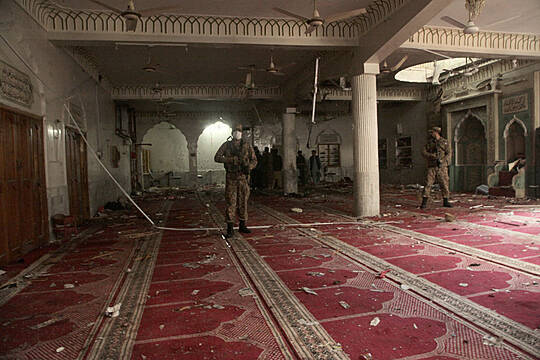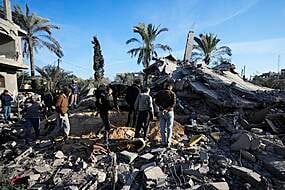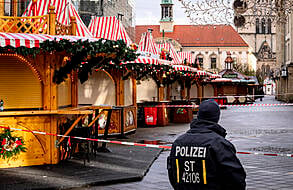A suicide bomber struck inside a Shiite Muslim mosque in Pakistan’s north western city of Peshawar during Friday prayers, killing at least 56 worshippers and wounding 194 people, hospital officials said.
No militant group immediately claimed responsibility for the attack.
Both the so-called Islamic State group and the Pakistani Taliban, a militant group separate from the Taliban in Afghanistan, have carried out similar attacks in the past in the area, located near the border with neighbouring Afghanistan.
According to the spokesman at Peshawar’s Lady Reading Hospital, Asim Khan, many of the wounded were in critical condition.
Scores of victims were peppered with shrapnel, several had limbs amputated and others were injured by flying debris.
Peshawar police chief Muhammed Ejaz Khan said the violence started when an armed attacker opened fire on police outside the mosque in Peshawar’s old city.
One policeman was killed in the gunfight, and another police officer was wounded.

The attacker then ran inside the mosque and detonated his suicide vest.
Local police official Waheed Khan said the explosion occurred as worshippers had gathered in the Kucha Risaldar Mosque for Friday prayers.
There are fears the death toll will rise further, he added.
Ambulances rushed through congested narrow streets carrying the wounded to Lady Reading Hospital, where doctors worked feverishly.
Shayan Haider, a witness, had been preparing to enter the mosque when a powerful explosion threw him to the ground.
“I opened my eyes and there was dust and bodies everywhere,” he said.
At the Lady Reading Hospital Emergency department, there was chaos as doctors struggled to move the many wounded into operating theatres.
Hundreds of relatives gathered outside the emergency department, many of them wailing and beating their chests, pleading for information about their loved ones.
Outside the mosque, Shiites pressed through the cordoned-off streets.
Kucha Risaldar Mosque is one of the oldest in the area, predating the creation of Pakistan in 1947 as a separate homeland for the Muslims of the Indian subcontinent.
The prayer leader, Allama Irshad Hussein Khalil, a prominent up and coming young Shiite leader, was among the dead.

Throughout the city, ambulance sirens could be heard.
Pakistan’s prime minister Imran Khan condemned the bombing.
Retired army officer Sher Ali who had been inside the mosque at the time of the explosion was injured by flying shrapnel.
He made a impassioned plea to the Pakistani government for better protection of the country’s minority Shiites.
“What is our sin? What have we done? Aren’t we citizens of this country?” he said from within the emergency department, his white clothes splattered with blood.
In majority Sunni Pakistan, minority Shiites have come under repeated attacks.
In recent months, Pakistan has experienced a broad increase of violence.
Dozens of military personnel have been killed in scores of attacks on army outposts along the border with Afghanistan.
Many attacks have been claimed by the Pakistani Taliban, who analysts say have been emboldened by the Afghan Taliban seizing power last August in Afghanistan.
Pakistan has urged Afghanistan’s new rulers to handover Pakistani Taliban militants who have been staging their attacks from Afghanistan.
The Afghan Taliban have said their territory will not be used to stage attacks against anyone, but until now have not handed over any wanted Pakistani militants.







